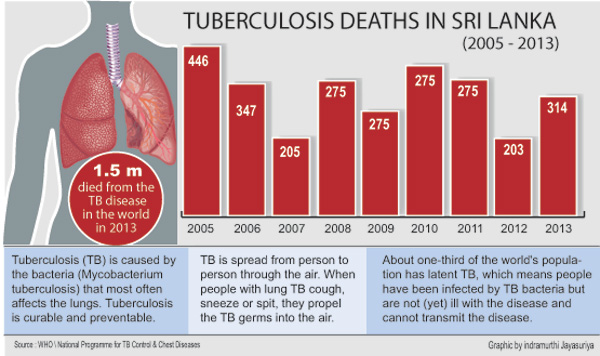News
No one to cough up cash, TB programme suffers
View(s):The National Programme for Tuberculosis Control and Chest Diseases (NPTCCD) will have to close some of its microscopy centres or scale down tests as funding dries out. The programme depends on aid from the Global Fund to Fight AIDS, Tuberculosis and Malaria, a public–private partnership that has its secretariat in Geneva, Switzerland, to pay salaries of lab technicians in 160 centres island-wide.
“Most of the lab technicians are employed on contract basis and when they don’t get their salaries, they will stop coming to work. The funding is over by the end of this month,” NPTCCD’s Deputy Director Dr. Sudath Samarweera said. According to him, the programme is struggling to maintain the centres with limited human resources although there is a demand for about 20 to 30 more centres too. Plans to recruit more lab technicians last year were halted due to funding issues.
At present, Sri Lanka has about 9,400 diagnosed TB patients, although the WHO estimates put the numbers around 14,000. The NPTCCD believes that annually about 4,000 TB patients do not seek medical treatment and this is a serious cause for concern.
The new agreement with the Global Fund is likely to be signed in September this year. Until such time the NPTCCD will have to run its testing centres at reduced capacity or turning some of them into collection points, with testing being conducted in lab with technicians.
The programme also plans to seek help from labs set up to test other diseases such as malaria and filaria.TB is prevalent mostly among slum dwellers, prison inmates and plantation workers. The NPTCCD also considers drug addicts, kidney disease and diabetic patients as high risk groups.
The increase in foreign workers coming to Sri Lanka from countries with high prevalence of TB — such as India and China — has also increased the risk of the disease in Sri Lanka. The NPTCCD has limited access to expatriate workers, as they are handled mostly through special BOI projects or government-to-government agreements, making it difficult to conduct awareness programmes or preventive programmes among them, Dr. Samaraweera said.
The Health Ministry is yet to fully establish a strategy to control migrant health issues in the country, although it has been on the discussion table since last year, he said.


